Introduction: In this article, Mary Harrell-Sesniak provides search tips to find information about babies in your family history research. Mary is a genealogist, author and editor with a strong technology background.
If you think about it, genealogy isn’t about ancestors—it’s about babies, because without progeny or descendants, genealogy simply couldn’t exist.
As the new grandparents of baby Eliza, my husband and I are thankful for this, as new family members are the key to making us ancestors!
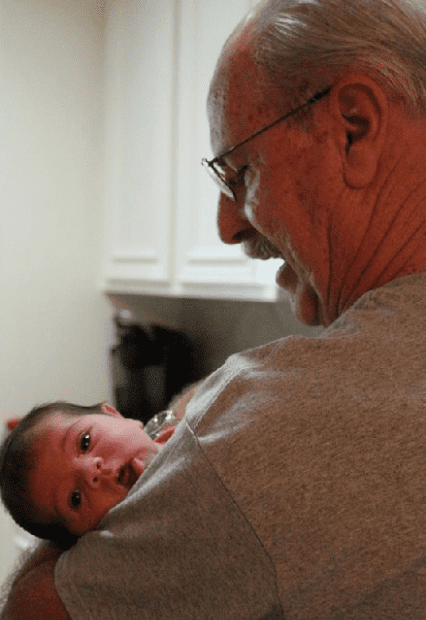
Fortunately, GenealogyBank has an entire section of its Historical Newspaper Archives devoted to research of these little family blessings. To access this content, select the Birth Records category on the newspaper search page.
Sometimes you may not find a hoped-for newspaper birth announcement, so I’d like to share some genealogy search tips for better research success.
Civil Registration Laws
Family history researchers are often disappointed when a courthouse doesn’t have a birth record. Mainly this is due to civil registration laws, which were instituted at varying times. Even when required by law, many parents and physicians did not comply by registering babies, so early newspaper birth announcements are important resources.
Newspaper Announcements Placed by Parents
Most birth announcements are placed by parents or hospitals. They often divulge the day of the blessed event, along with details about the parental names and family address. If you are lucky, you may also locate a notice of baptism. In either case, if the announcement was published shortly after birth, then the baby’s name may not be included—so this is a clue to locating an elusive notice.
Genealogy Search Tip: If you can’t find a birth announcement by searching on the child’s name, try searching the parents’ names, the family’s home address—or the date of the birth.
For example, notice that in these birth announcements from 1912 the parents’ names and home addresses are given, but not the babies’ names—in each case the child is only called “a daughter” or “a son.”
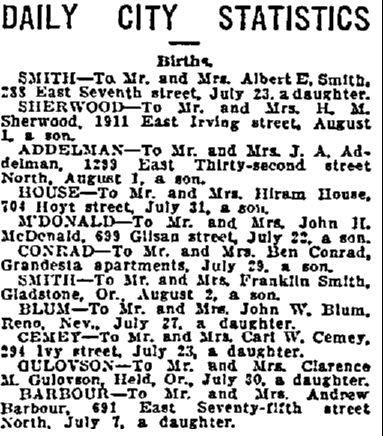
Notice that this birth announcement for Nora Maria Meyers states that her baptism was performed at the hospital.
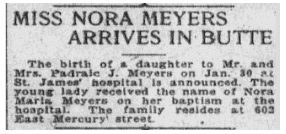
Genealogy Search Tip: Contrary to popular belief, not all baptisms were performed in churches or religious institutions.
Newspaper Announcements by Others
Don’t be surprised to find birth announcements placed by members of the family other than the parents, or even a mention of a new birth in a family reunion notice or obituary. As you see from this classified advertisement from 1969, the proud grandparents, great grandparents and great great grandparents had the birth announcement published to welcome little James into the world.
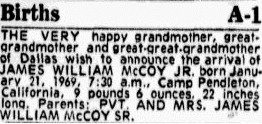
Expand Searches to Other Locations
Most researchers limit searches to a home town, but as seen in the example above, it’s entirely possible that a notice might be placed in a city newspaper where the child was not born. James was born at Camp Pendleton in San Diego County, California, but his birth announcement was published in Dallas, Texas. If the query had been limited to California, the announcement would have been missed.
Genealogy Search Tip: If you can’t find a birth location, consider if the parents were stationed elsewhere by the military.
Small Town vs. Large Town Newspapers
Although there are exceptions, small town or city newspapers are able to include expanded details about births that larger publications have to eliminate. Some smaller newspapers many even include notices from surrounding areas, such as these birth announcements from a Fort Wayne, Indiana, newspaper published in 1918 that have birth news from the towns of Angola, Waterloo and Warsaw.
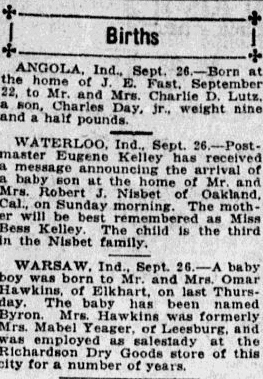
Genealogy Search Tip: If you can’t find a birth announcement in your ancestor’s home town, consider if a neighboring town’s newspaper may have published one.
Search Terms in Foreign-Language Newspapers
If your ancestor’s family was an immigrant family or lived in a multicultural community, try incorporating foreign terms in your newspaper search for birth announcements. Long ago, many immigrant communities published local newspapers in Old World languages. For example, this 1928 announcement from Maine was published by a French-language newspaper, and reports the births of two sons (indicated by “fils”). I found this birth announcement by searching for the French word “naissance,” which translates into English as “birth.”
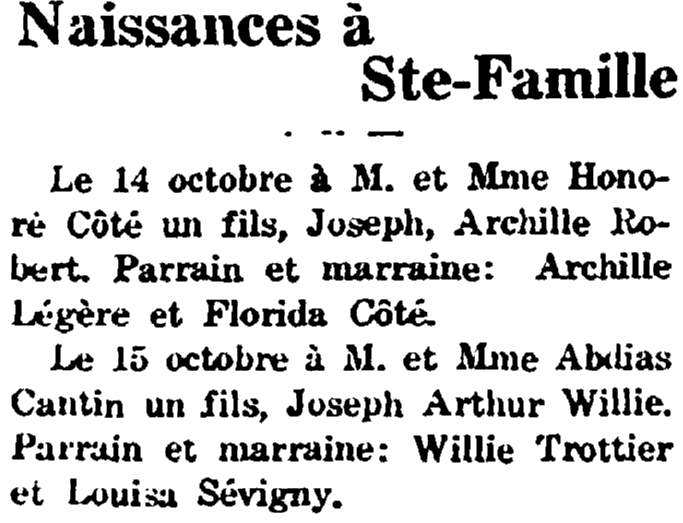
Genealogy Search Tip: To learn the equivalent terms for the word “birth” used in foreign-language newspapers, search glossaries or use a translator such as Google Translate.
This Google service will translate the word “birth” into a variety of foreign languages. Now enter the translated word into GenealogyBank’s search box and select the Birth Records category.
Interesting Facts about Babies Found on the Web
- A baby is born into the world about every three seconds.
- The U.S. sees over four million arrivals every year.
- Babies have more bones than adults, who have 206. Several of a baby’s bones fuse over time, which results in the smaller adult number.
- Babies have more taste buds than adults. Some appear in different places of the mouth, but eventually disappear.
- Babies do not have kneecaps.
- Babies born in May are the heaviest.
- The heaviest baby reported to have survived was a 22-pound 8-ounce Italian baby born in 1955. In 1879, a woman in Canada gave birth to a 23-pound 1.92-ounce baby that died shortly after birth. These weights are typically what a one-year-old might weigh! (See the newspaper article below for a fun report.)
Giant Baby
If you search historical newspapers you’ll find reports of many unique baby records, including this article from 1893—when a baby weighing 23 ¾ pounds was born to “giants.” He reportedly was 2 ½ feet in length and had a “cute little pink foot” measuring 5 ½ inches. Perhaps this report was a slight exaggeration, as we notice that neither the parents nor the child was named in the article.
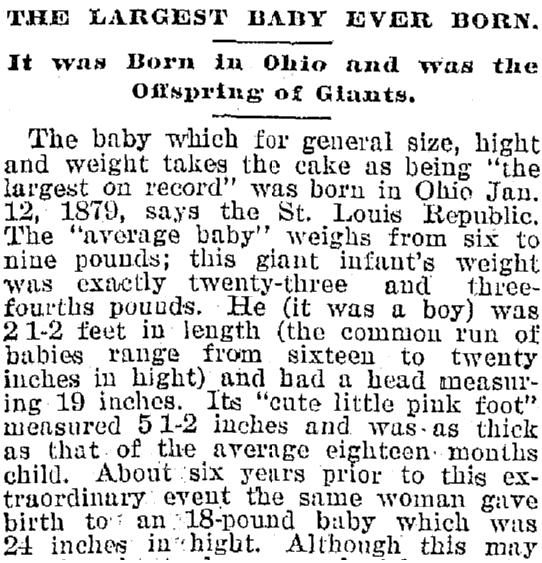

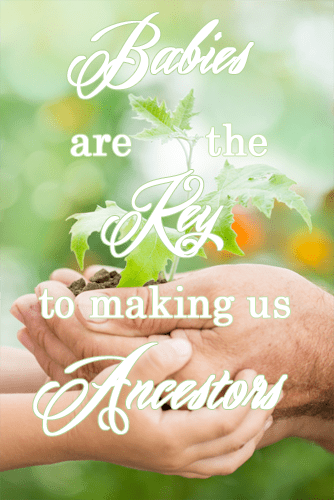
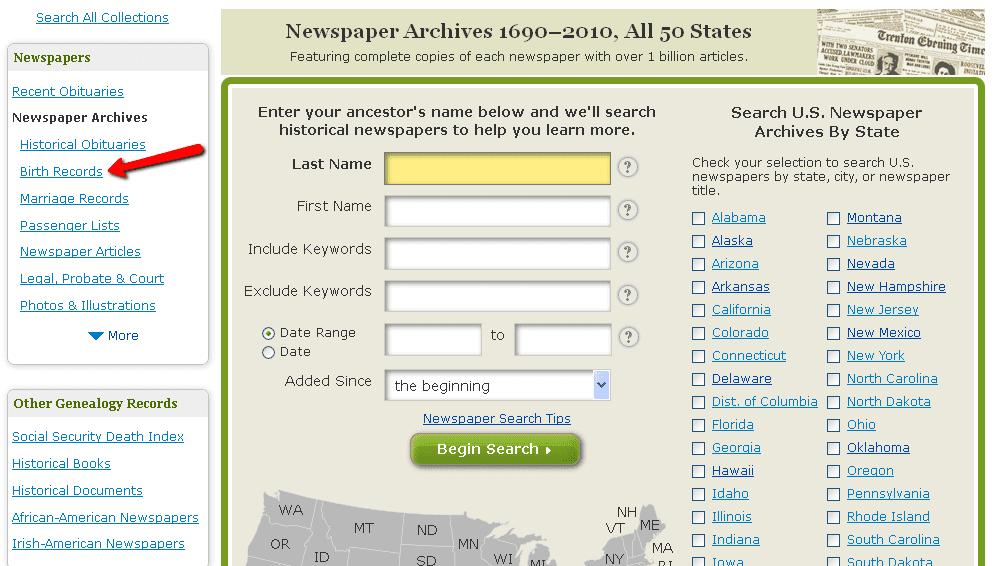
Rather than a comment, I have a question. My mother delivered twins who died at birth. I have no information other than they were boys, would have been born between 1938 and 1943 at Green County Hospital, Catskill, New York, (where my brother was born in 1940 and I was born in 1944), and my grandfather took care of the arrangements. How would I go about searching for more specific information as to the date of birth? The hospital no longer exists as Green County Hospital, but maybe renamed Memorial Hospital. I live in Florida so on site research is not possible. Any assistance would be greatly appreciated. Thank you. Paula J. Beckner (Please reply to my email address, if possible).
Paula,
So sorry for your family’s loss, even though it was long ago.
Hospital records from the 1940s may be protected, so your best option is to order a death certificate from Catskill. New York has specific requirements, so if they will not release it, check with a research librarian to see if they can find a newspaper record.
Mary